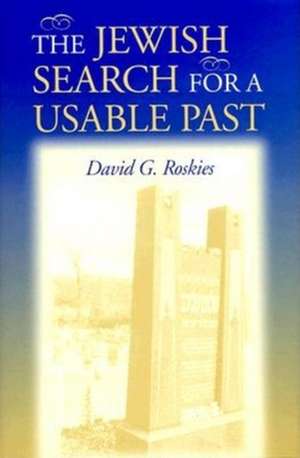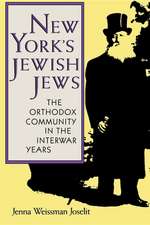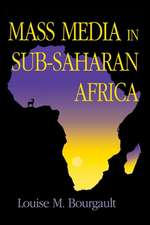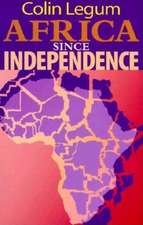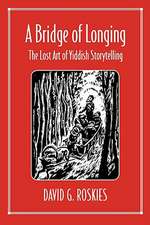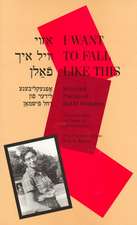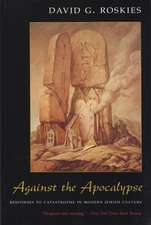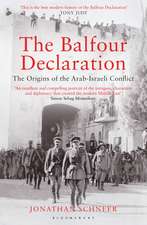The Jewish Search for a Usable Past: The Helen and Martin Schwartz Lectures in Jewish Studies
Autor David G. Roskiesen Limba Engleză Hardback – 21 mai 1999
Preț: 227.79 lei
Nou
Puncte Express: 342
Preț estimativ în valută:
43.59€ • 45.51$ • 35.99£
43.59€ • 45.51$ • 35.99£
Carte tipărită la comandă
Livrare economică 15-29 aprilie
Preluare comenzi: 021 569.72.76
Specificații
ISBN-13: 9780253335050
ISBN-10: 0253335051
Pagini: 232
Ilustrații: 17 b&w photographs, 9 figures, 1 index
Dimensiuni: 173 x 239 x 19 mm
Greutate: 0.51 kg
Editura: MH – Indiana University Press
Seria The Helen and Martin Schwartz Lectures in Jewish Studies
ISBN-10: 0253335051
Pagini: 232
Ilustrații: 17 b&w photographs, 9 figures, 1 index
Dimensiuni: 173 x 239 x 19 mm
Greutate: 0.51 kg
Editura: MH – Indiana University Press
Seria The Helen and Martin Schwartz Lectures in Jewish Studies
Cuprins
Preface and Acknowledgments
1. The Jewish Search for a Usable Past
2. The Library of Jewish Catastrophe
3. RingelblumÕs Time Capsules
4. The Shtetl in Jewish Collective Memory
5. Rabbis, Rebels, and the Lost Art of the Law
6. The Golden Peacock: The Art of Song
7. A Culture Set in Stone: The Art of Burial
8. A City, a School, and a Utopian Experiment
9. Zionism, Israel, and the Search of a Covenantal Space
Conclusion
Notes
Index
1. The Jewish Search for a Usable Past
2. The Library of Jewish Catastrophe
3. RingelblumÕs Time Capsules
4. The Shtetl in Jewish Collective Memory
5. Rabbis, Rebels, and the Lost Art of the Law
6. The Golden Peacock: The Art of Song
7. A Culture Set in Stone: The Art of Burial
8. A City, a School, and a Utopian Experiment
9. Zionism, Israel, and the Search of a Covenantal Space
Conclusion
Notes
Index
Recenzii
Roskies (Jewish Theol. Seminary) shows that the Jewish present is not evolving as a simple continuation of the past nor, contrary to what is often claimed, is it emerging from a radical break with the past. It sits, rather, upon what Roskies calls memory sites, images of the past recreated from the ashes of destruction and the potentially debilitating sense of Jewish loss these catastrophes create. How are such memory sites created? Roskies illustrates the process through careful and engaging examinations of, among other topics, Jewish chronicles of the Warsaw Ghetto, of Jewish rethinking of Jewish participation in the early socialist and Zionist movements, and of the function of the concept of holy space for secular Israelis. These studies, each a gem unto itself, together reveal how Jews cope with loss and catastrophe and illustrate that it is exactly by coping with loss and tragedy that Jews create a usable past and, in the process, define their present and shape their future. Recommended for general readers and for faculty and researchers. --A. J./P>--Peck, College of the Holy Cross"Choice" (01/01/2000)
Notă biografică
A rich, sweeping memoir by David G. Roskies, Yiddishlands proceeds from the premise that Yiddish culture is spread out among many different people and geographic areas and transmitted through story, song, study, and the family. Roskies leads readers through Yiddishlands old and new by revisiting his personal and professional experiences and retelling his remarkable family saga in a series of lively, irreverent, and interwoven stories. Beginning with a flashback to his grandmother's storybook wedding in 1878, Yiddishlands brings to life the major debates, struggles, and triumphs of the modern Yiddish experience, and provides readers with memorable portraits of its great writers, cultural leaders, and educators.
Roskies's story centers around Vilna, Lithuania, where his mother, Masha, was born in 1906 and where her mother, Fradl Matz, ran the legendary Matz Press, a publishing house that distributed prayer books, Bibles, and popular Yiddish literature. After falling in love with Vilna's cabaret culture, an older man, and finally a fellow student with elbow patches on his jacket, Masha and her young family are forced to flee Europe for Montreal, via Lisbon and New York. It is in Montreal that Roskies, Masha's youngest child, comes of age, entranced by the larger-than-life stories of his mother and the writers, artists, and performers of her social circle. Roskies recalls his own intellectual odyssey as a Yiddish scholar; his life in the original Havurah religious commune in Somerville, Massachusetts, in the 1970s; his struggle with the notion of aliyah while studying in Israel; his visit to Russia at the height of the Soviet Jewry movement; and his confrontation with his parents' memories in a bittersweet pilgrimage to Poland. Along the way, readers of Yiddishlands meet such prominent figures as Isaac Bashevis Singer, Melekh Ravitch, Itsik Manger, Avrom Sutzkever, Esther Markish, and Rachel Korn.
With Yiddishlands, readers take a whirlwind tour of modern Yiddish culture, from its cabarets and literary salons to its fierce ideological rivalries and colorful personalities. Roskies's memoir will be essential reading for students of the recent Jewish past and of the living Yiddish present. An audio CD of Masha Roskies singing in Yiddish, Russian, and Polish is also included with this volume.
Roskies's story centers around Vilna, Lithuania, where his mother, Masha, was born in 1906 and where her mother, Fradl Matz, ran the legendary Matz Press, a publishing house that distributed prayer books, Bibles, and popular Yiddish literature. After falling in love with Vilna's cabaret culture, an older man, and finally a fellow student with elbow patches on his jacket, Masha and her young family are forced to flee Europe for Montreal, via Lisbon and New York. It is in Montreal that Roskies, Masha's youngest child, comes of age, entranced by the larger-than-life stories of his mother and the writers, artists, and performers of her social circle. Roskies recalls his own intellectual odyssey as a Yiddish scholar; his life in the original Havurah religious commune in Somerville, Massachusetts, in the 1970s; his struggle with the notion of aliyah while studying in Israel; his visit to Russia at the height of the Soviet Jewry movement; and his confrontation with his parents' memories in a bittersweet pilgrimage to Poland. Along the way, readers of Yiddishlands meet such prominent figures as Isaac Bashevis Singer, Melekh Ravitch, Itsik Manger, Avrom Sutzkever, Esther Markish, and Rachel Korn.
With Yiddishlands, readers take a whirlwind tour of modern Yiddish culture, from its cabarets and literary salons to its fierce ideological rivalries and colorful personalities. Roskies's memoir will be essential reading for students of the recent Jewish past and of the living Yiddish present. An audio CD of Masha Roskies singing in Yiddish, Russian, and Polish is also included with this volume.
Descriere
A lively tour of the landscape of modern Jewish memory sites from the Old and New Worlds and the Land of Israel.
